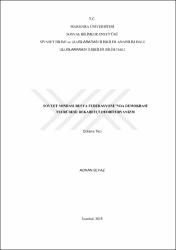Sovyet Sonrası Rusya Federasyonu'nda Demokrasi Tecrübesi: Rekabetçi Otoriteryanizm

Göster/
Erişim
info:eu-repo/semantics/embargoedAccessTarih
2019-06-28Üst veri
Tüm öğe kaydını gösterÖzet
Bu tez, demokratik geçiş döneminde bulunan melez rejimlerden kayda değer bir kısmının hem otoriter hem de demokratik bazı özellikleri barındıran bir yapıya bürünerek yeni bir rejim tipi oluşturduğu iddiasındaki rekabetçi otoriteryanizmi teorik çerçeve olarak benimsemektedir. Bu çerçevede Rusya Federasyonu'nun siyasal tecrübesi ilk devlet başkanı Yeltsin ve 2000 sonrası Putin dönemleri üzerinden incelenmiştir. Her iki dönemde de iktidarın hem rejimin rekabetçi özelliğinin korunması hem de otoriter yapının tesisini sağlamaya çalışması rekabetçi otoriteryan rejimin özelliklerinin tespit edilmesine imkân veren seçimler, medya, parlamento, yargı, protestolar, elitler ve ülkenin siyasal kültürü gibi platformlar incelenerek ortaya konulmuştur. Bu teorik çerçevenin tercih edilmesinde geçiş dönemi ülkelerinin bir kısmı demokratikleşmesini tamamlar veya tam otoriter rejime dönüşü tecrübe ederken Rusya Federasyonu'nun rekabetçi otoriter rejim özelliklerini çeyrek yüzyıl boyunca istikrarlı bir şekilde sürdürmesi etkili olmuştur. Bu çalışmada, Rus siyasal rejiminin rekabetçi unsurlarının yanı sıra otoriter yapısını pekiştiren seçimlerin özgür fakat adil olmaması, medyanın kontrol altına alınması, parlamento ve yargının iktidarın etkisinde kalması, protestoların kontrol edilmesi, siyasal kültürün etkisinin bilinçli bir şekilde iktidar tarafından kullanılması tespit edilmeye çalışılmıştır. 1990larda uluslararası arenada kabul görme ihtiyacı ile Batı dünyasının siyasal özelliklerinin kabul edilmesi, devlet yapısının zayıflığı, 'aile' ve oligarkların rejim üzerinde etkili olması, dikey iktidar yapısının inşa edildiği Putin dönemi ile öncesini iki ayrı bölümde inceleme ihtiyacını doğurmuştur. Çalışma sonucunda rejimin 1990lardan 2018 başkanlık seçimine kadarki dönemde giderek daha otoriter bir yapıya büründüğü tespit edilmiştir. Yine de tam otoriter rejim adlandırması doğru olmayacağından uluslararası alanda rejim değerlendirmesi yapan kuruluşların verilerine başvurulmuştur. Freedom House'un Nations in Transit, Countries at the Crossroads, Political Rights ve Civil Liberties indeksleri ile Polity IV, Sustainable Governance Indicators (SGI), The EIU, World Governance Indicators ve The Bertelsmann Transformation Index (BTI) verileri kullanılmıştır. Ayrıca basın özgürlüğü alanında Reporters Without Borders, hukukun üstünlüğü alanında Rule of Law Index ve yolsuzluk alanında Transparency International verilerinden de destek alınarak Rus siyasal rejimi Yeltsin ve Putin dönemleri üzerinden daha anlaşılır bir şekilde analiz edilmiş ve somut bilgilerle zenginleştirilmiştir. This thesis accepts competitive authoritarianism as a theoretical framework which claims that significant number of hybrid regimes created a new regime type having both democratic and authoritarian peculiarities. Within this framework the political experience of the Russian Federation is analyzed through Yeltsin and Putin periods. President’s endeavor to keep the regime both competitive and authoritarian in both periods is revealed through analyzing elections, media, parliament, judiciary, protests, elites and the political culture of the country which are the platforms for the evaluation of a competitive authoritarian regime. The continuation of the stable hybrid regime in Russia for a quarter of a century while some other hybrid regimes democratized or adopted full authoritarian rule became effective in the preference of this theoretical framework. In this context, the authoritarian peculiarities such as conducting free but unfair elections, taking media under control of the government, bringing the parliament and the judiciary under the influence of the government, controlling the protests, government’s usage of the political culture of the country in addition to the competitive peculiarities of the Russian political regime is tried to be determined in this study. The adoption of the Western world’s political features depending on the need to be accepted in the international arena, the weakness of the Russian state and the influence of the ‘family’ and the oligarchs in the 1990s necessitated to analyze Yeltsin and Putin periods in different sections. By conducting this study, it is determined that the Russian political regime has gradually been losing the competitive peculiarities of the regime from 1990s to March 2018 presidential elections and assumed a more authoritarian regime. However, since it is not true to name it as full authoritarian, I researched that how the international institutions studying on the evaluation of the regime types examine the situation. Within this framework, data from Freedom House’s Nations in Transit, Countries at the Crossroads, Political Rights and Civil Liberties indexes and Polity IV, Sustainable Governance Indicators (SGI), The Economist Intelligence Unit (EIU), World Governance Indicators and The Bertelsmann Transformation Index (BTI) is used. In addition, data of the Reporters Without Borders working on the press freedom, Rule of Law Index working on evaluation of the countries based on the rule of law and Transparency International producing corruption indexes is used in order to make the evaluation of the Yeltsin and Putin periods more concrete and comprehensible


















